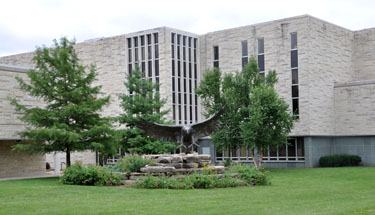KBI plans new building
March 13, 2014
Washburn University and the Kansas Bureau of Investigation are breaking ground for the Forensic Science Center in May when students begin their summer break this year, when completed, the KBI will be occupying approximately 90 percent of the building and WU will occupy 10 to 12 percent.
The KBI will have their main lab here and their administration building will stay in their old offices on 17th street. The Forensic Science Center will be located on the south side of the Petro building. The building will also be something law students may use to understand forensics.
“We will develop a program related to digital forensics,” said Dr. Randy Pembrook, vice president of Academic Affairs. “It targets what happens when the bad guys use computers, mobile phones, Ipads, whatever, for anything from embezzling to pornography.”
Forensic scientists also gather physical and other evidence to help solve crimes. They analyze firearms, blood semen, fingerprints saliva, skeletal remains, drugs and blood. Forensic science can be the one thing that convicts or exonerates a suspect. They work in conjunction with attorneys and law enforcement and their performance in these matters is critical.
Washburn already has classes where students are getting degrees in Criminal Justice and in forensic chemical science. But because so much evidence is found in outside environments, there will be an outdoor CSI lab. Similar to the “body farms” they have at other institutions, Pembrook believes they may use the remains of a pig or hog instead of human remains. The lab will also include other objects that are found at crime scenes to help law enforcement solve them.
The items will be observed to discover how they decompose in an outdoor environment. Students will also learn how to understand blood and liquid splatter. The lab should help law enforcement locally to get evidence to trial quicker with what is learned there.
Law enforcement does not always find evidence at the time of the crime, it could be found a year or more later. Pembrook noted that police officers know how to protect citizens, but if a body turns up that has been missing for years, this is something our students will be learning about to specialize in.
“We think it will be really interesting,” said Pembrook. “To give students the ability to learn those upper end specialty skills. Anthropology students will have cabinets where they can pull out skeletal remains to investigate.”
Brittany Moes, senior criminal justice student and president of the Criminal Justice Association said “I think it is a great thing and it will give more students more of an opportunity to have those types of classes.”
Some members of the KBI will also serve as adjunct professors to WU students. In turn, students will be able to intern with the KBI.
When they have staffing needs, our graduates may be able to become staff there. They will know how to handle evidence and deal with the chain of custody of materials. Pembrook would like to see a generation of our students working for the KBI.
“It’s an exciting project,” said Pembrook. “Washburn and the KBI have been working together on this for a long time.”



